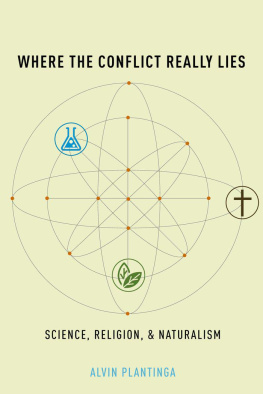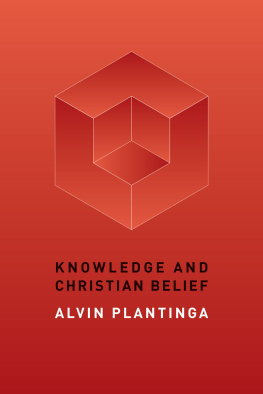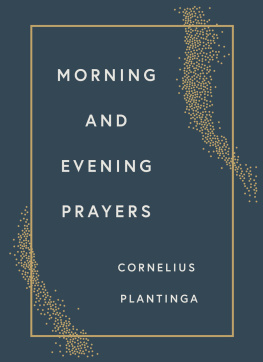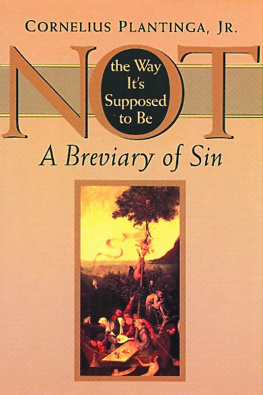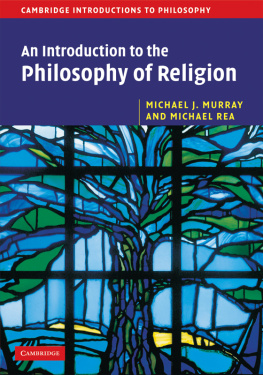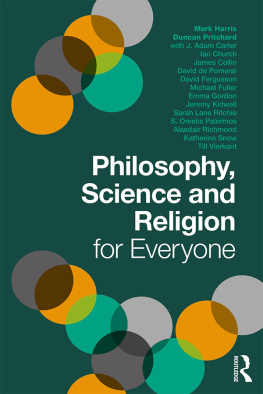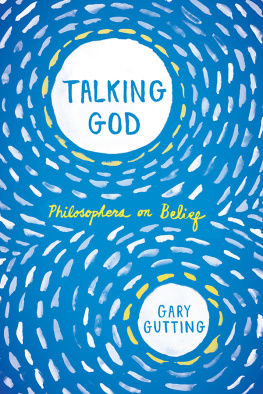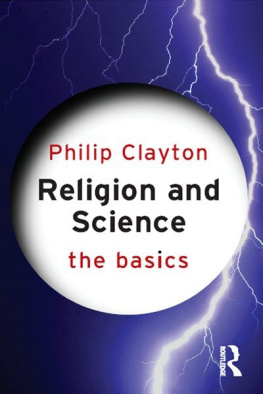WHERE THE CONFLICT REALLY LIES
WHERE THE CONFLICT
REALLY LIES
Science, Religion, and Naturalism
Alvin Plantinga


Oxford University Press, Inc., publishes works that further
Oxford Universitys objective of excellence
in research, scholarship, and education.
Oxford New York
Auckland Cape Town Dar es Salaam Hong Kong Karachi
Kuala Lumpur Madrid Melbourne Mexico City Nairobi
New Delhi Shanghai Taipei Toronto
With offices in
Argentina Austria Brazil Chile Czech Republic France Greece
Guatemala Hungary Italy Japan Poland Portugal Singapore
South Korea Switzerland Thailand Turkey Ukraine Vietnam
Copyright 2011 Oxford University Press
Published by Oxford University Press, Inc.
198 Madison Avenue, New York, New York 10016
www.oup.com
Oxford is a registered trademark of Oxford University Press
All rights reserved. No part of this publication may be reproduced, stored in a retrieval system, or transmitted, in any form or by any means, electronic, mechanical, photocopying, recording, or otherwise, without the prior permission of Oxford University Press.
Library of Congress Cataloging-in-Publication Data Plantinga, Alvin.
Where the conflict really lies : science, religion, and naturalism / Alvin Plantinga.
p. cm.
ISBN 978-0-19-981209-7 (hardcover : alk. paper)
1. Religion and science. 2. Evolution (Biology)Religious aspectsChristianity. 3. NaturalismReligious aspectsChristianity. I. Title.
BL240.3.P53 2011
231.765dc22
2011002532
1 3 5 7 9 8 6 4 2
Printed in the United States of America
on acid-free paper
CONTENTS
PART I
ALLEGED CONFLICT
PART II
SUPERFICIAL CONFLICT
PART III
CONCORD
PART IV
DEEP CONFLICT
PREFACE
My overall claim in this book: there is superficial conflict but deep concord between science and theistic religion, but superficial concord and deep conflict between science and naturalism.
Now central to the great monotheistic religionsChristianity, Judaism, Islamis the thought that there is such a person as God: a personal agent who has created the world and is all-powerful, all-knowing, and perfectly good. I take naturalism to be the thought that there is no such person as God, or anything like God. Naturalism is stronger than atheism: you can be an atheist without rising to the full heights (sinking to the lowest depths?) of naturalism; but you cant be a naturalist without being an atheist.
Naturalism is what we could call a worldview, a sort of total way of looking at ourselves and our world. It isnt clearly a religion: the term religion is vague, and naturalism falls into the vague area of its application. Still, naturalism plays many of the same roles as a religion. In particular, it gives answers to the great human questions: Is there such a person as God? How should we live? Can we look forward to life after death? What is our place in the universe? How are we related to other creatures? Naturalism gives answers here: there is no God, and it makes no sense to hope for life after death. As to our place in the grand scheme of things, we human beings are just another animal with a peculiar way of making a living. Naturalism isnt clearly a religion; but since it plays some of the same roles as a religion, we could properly call it a quasi-religion.
If my thesis is right, thereforeif there is deep concord between science and Christian or theistic belief, but deep conflict between science and naturalismthen there is a science/religion (or science/ quasi-religion) conflict, all right, but it isnt between science and theistic religion: its between science and naturalism.
Many would dispute my claim that there is no serious conflict between religion and scienceindeed, many seem to think naturalism or atheism is part of the scientific worldview. Among them are the new atheists: Richard Dawkins, Daniel Dennett, Christopher Hitchens, and Sam Harris. These are the Four Horsemennot of the Apocalypse, nor of Notre Dame, but of atheism; and their aim is to run roughshod over religion. Their objections and complaints are manifold. First, they attribute most of the ills of the world to religion: they point to the Crusades, to witch hunts, to religious wars, to intolerance, to current terrorism, and much else besides. Of course the worlds religions do indeed have much to repent; still (as has often been pointed out) the suffering, death, and havoc attributable to religious belief and practice pales into utter insignificance beside that due to the atheistic and secular idiologies of the twentieth century alone.
The Four Horsemen also claim that religious belief is unreasonable and irrational, as silly as believing in the Spaghetti Monster or Superman, or maybe even the Green Lantern. Their claims are loud and strident. They propose to deal with their opponents not by way of reasoned argument and discussion, but by way of ridicule and naked contempt (see footnote 16 in this route is not wholly clear. One possibility, of course, is that their atheism is adolescent rebellion carried on by other means. Another (consistent with the first) is that they know of no good reasons or arguments for their views, and hence resort to schoolyard tactics. In terms of intellectual competence, the new atheists are certainly inferior to the old atheistsBertrand Russell and John Mackie come to mind. They are also inferior to many other contemporary but less strident atheistsThomas Nagel, Michael Tooley, and William Rowe, for example. We may perhaps hope that the new atheists are but a temporary blemish on the face of serious conversation in this crucial area.
Be all that as it may, these new atheists unite with the old atheists in declaring that there is deep and irreconcilable conflict between theistic religionChristian belief, for exampleand science. (And here they are joined by some from the opposite end of the spectrum: those Christians who believe that reason and modern science are the enemies of Christian belief.) Now if this were true, it would be both important and unhappy. Modern science is certainly the most striking and impressive intellectual phenomenon of the last half millennium. Think of the development of physics from the time of Isaac Newton to the present: the sheer intellectual brilliance and power of that tradition is astonishing. It involves a large number of extremely talented people, but also an army of less incandescent luminariesall addressing an evolving set of overlapping questions in such a way that the later answers often build on and carry further the earlier answers. What is particularly striking about modern science (at least to a philosopher) is that it is in this way a cooperative venture. (Of course it is also, often, an extremely competitive venture.) Scientists not only collaborate with each other; they regularly build on each others results.
Its no surprise that this intellectual splendor has also had some unfortunate and unintended side effects. Some treat science as if it were a sort of infallible oracle, like a divine revelationor if not infallible (since it seems so regularly to change its mind), at any rate such that when it comes to fixing belief, science is the court of last appeal. But this cant be right. First, science doesnt address some of the topics where we most need enlightenment: religion, politics, and morals, for example. Many look to scientists for guidance on matters outside of science, matters on which scientists have no special expertise. They apparently think of scientists as the new priestly class; unsurprisingly, scientists dont ordinarily discourage this tendency. But of course a scientist pontificating on matters outside her field is no better than anyone else pontificating on matters outside her field. Second, science contradicts itself, both over time and at the same time. Two of the most important and overarching contemporary scientific theories are general relativity and quantum mechanics. Both are highly confirmed and enormously impressive; unfortunately, they cant both be correct.
Next page
